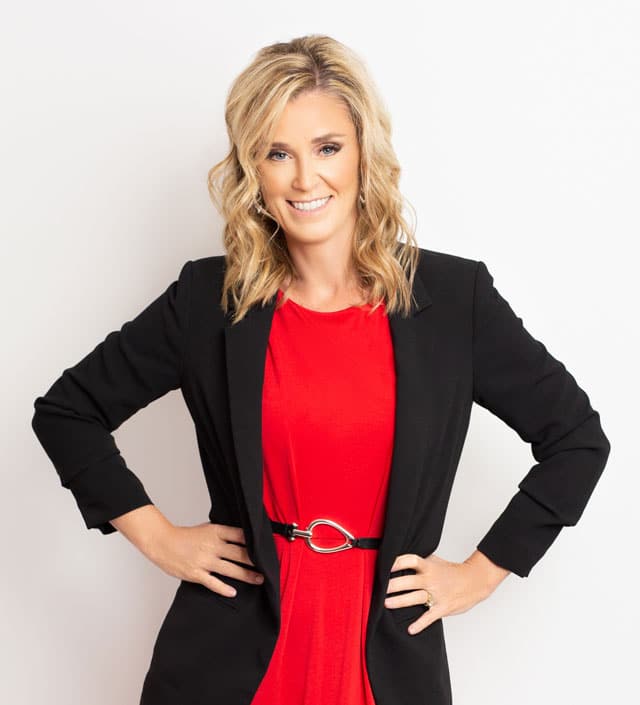Mindy McCubbin, founder of Truman Wealth Advisors, grew her assets under management from zero to $100 million in less than five years by focusing on finding new clients, hiring staff and delegating all but the tasks she excels at most.
McCubbin, CFP, ChFC, also uses newsletters and social media to engage her current and potential client base on a variety of topics.
“My last newsletter was about my dog and I got referrals from that,” she laughed, referring to “Rogue,” who lives with her and her family in Columbia, Missouri.
“It’s not just about talking to clients about what the S&P 500 is doing. I offer to sit down informally, over coffee, and let them know I want to know who they are,” she said. “There’s a perception that you have to get out there and pound on doors. But putting yourself out there authentically is always the best strategy.”
Once she has those conversations with clients, she can custom-tailor financial plans for them. That approach has helped her find and retain clients, with the current roster at 60.
McCubbin shared her story during a recent webinar hosted by Katie Burke, CFP, co-founder of Equita Financial Network, as part of the Equita Inspiring Insight Series. Truman Wealth became an Equita affiliate in 2019 and provides investment advice under its RIA.
Starting her own business
When McCubbin started her firm, she charged $1,000 for each financial plan. “People would laugh at that now,” she said. “I was undercharging. Now I charge $3,000. I’m probably still undercharging.” Typically, she charges 80 to 125 basis points of assets under management.
“I have three criteria for working with a client: Do we have a great rapport? Does this make economic sense for both of us? Will they take my advice?” McCubbin explained in a follow-up interview with Rethinking65.
McCubbin had worked in corporate finance for Boeing Co. and then in portfolio management for Shelter Insurance. In 2017, she followed her instincts and decided to invest her $50,000 in savings to open her own financial advising firm.
She did extensive research, including talking to many others who had made the leap. She hung out her shingle in 2018 and earned $7,000 in revenue in 2019, using her past business relationships and finding new clients.
In very early 2020, before the pandemic, she realized she liked having her own financial-planning firm. She felt she was on the right track. Then the pandemic hit and she worried about the impact on her business.
“I thought it would be horrible timing, but it ended up being wonderful timing,” she said.
People were willing to engage advisors, in some cases for the first time, and she was able to get some new clients that year and the next. Her revenues rose to $70,000 in 2020 and over the next couple of years she moved into her “growth and leverage” phase, By the end of this year, her revenues “will be close to $600k on approximately $100 million of assets under management,” she said.
“Basically, it took one year to 10x revenue and then three years to almost 10x revenue again,” said McCubbin.
When you hire staff, clients know you’re growing
“Now I’m in an ‘invest and scale phase,’ ” she said. “I hired an advisor, a virtual assistant and opened an office.”
At first, McCubbin said, she was concerned about whether she would be able to afford her new advisor’s salary. But then something unexpected happened: When clients noticed she was bringing a new advisor on board, they said, “Oh, you’re growing” and some gave her additional work or referred new clients to her.
“You don’t realize sometimes that clients view you as a limited commodity,” she said. Some may even hesitate to refer their advisors to others because they may be concerned that the advisors will have less time for them, she said.
Additional Reading: Female Rainmakers Reveal Secrets to Success
When she hired staff, she didn’t necessarily feel like she was ready for it. “But you have to do things before you’re ready,” McCubbin said. “I can only do that when I’ve seen someone else do it before me.” That’s where relationships with other advisors, her membership in Equita and another mastermind group, and having her own career coach help.
Why delegating is critical
About 40% of Truman’s clients are transitioning into retirement and are served by the advisor who works for McCubbin. About 50% are business owners and entrepreneurs. Approximately 10% of her remaining clients are what McCubbin calls “the grads” — her most highly successful and experienced business owners.
McCubbin said learning how to delegate the tasks she least enjoys has allowed her to focus on finding and retaining clients and custom-tailoring financial strategies for them. These are the tasks that she excels at and enjoys most.
“Some advisors don’t like to delegate certain tasks, like billing and paperwork and others,” she said. “You have to give up some of the control when you delegate the work. They may feel like someone else won’t do those tasks exactly the same way they do them. But delegating the $10- to $50-an-hour tasks to others has allowed me to focus on the $300-an-hour tasks, like the complicated financial strategies. If you try to do it all yourself, you’re not going to grow your business to $100 million in five years.”
McCubbin said delegating tasks to staff and others works well because she leverages the best of their skills and talents so they’re doing what they do best, freeing her up to do what she does best.
“If you know who you are, it makes exponential growth easier,” she said.
Benefits of belonging to an RIA
The “others” she relies on are her own staff and Equita. In addition to providing investment advice under Equita’s RIA, she pays the firm to do her billing, compliance, technology and trading. Members of the Equita network are women-led, independently operated, fee-only financial planning firms.
“I like the flexibility the RIA fee structure gives me, including the ability to charge retainers,” McCubbin said. She also values her business relationship with Equita, she said, and the additional support it provides.
For example, when she started working with a client and then realized the individual was in the early stage of dementia, she called Burke, the organization’s compliance officer, to get advice.
When asked if she makes cold calls to find clients, she said, “Never. I would be horrible on a cold call. If you’re a cold caller, good. You have to figure out what works for you and what attracts the kind of people you want to work with.”
McCubbin said there have been times she has invested in failed strategy, such as when she joined a business group. “I got one new client, but it took a lot of time.” Lesson learned.
Another source of advice for McCubbin was the book, “10X is Easier than 2X,” by Dan Sullivan and Dr. Benjamin Hardy, which discusses why achieving 10 times growth is easier than doubling growth. According to the book, exponential growth involves expanding what Sullivan calls the four most important freedoms: time, money, relationships and purpose.
McCubbin said she decided to name her firm Truman Wealth Advisors because she had attended Truman University and admired President Truman, who was from Missouri.
McCubbin plans to continue using her strategies of: investing time in finding new clients through social media and newsletters; nurturing client relationships by taking the time to get to know them and what their financial goals are; taking risks even when she feels like it might not be the perfect time to do so; and delegating tasks to staff and professional groups she belongs to so she can concentrate on what she enjoys most and what’s most important for running and growing the business.
Denise DiStephan is an award-winning, veteran journalist and communications professional based in New Jersey.







